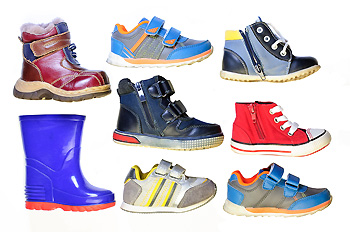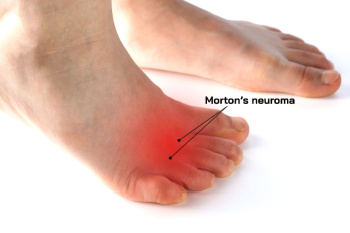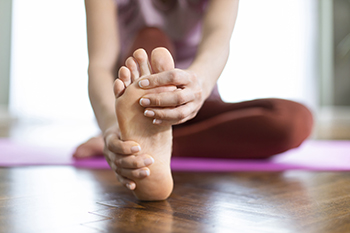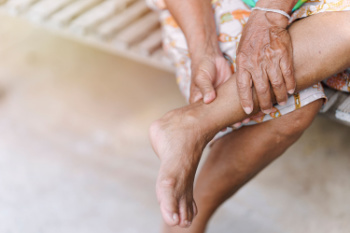Connect With Us
Blog
Items filtered by date: December 2024
When and How to Select the Right Shoes for Toddlers

Selecting the right shoes for toddlers is essential for their comfort and foot development. It is important to choose shoes when your toddler begins to walk, as proper footwear can support their growing feet. Look for shoes that provide ample room for the toes to move freely, as tight shoes can hinder natural foot development. Soft, flexible soles are key to allowing the feet to move naturally while providing protection. Ensure the shoes have adequate arch support and cushioning to absorb shock and reduce pressure on the feet. The fit is important, so check the shoes regularly to ensure they are not too tight as your child’s feet grow quickly. Choose lightweight shoes that are easy to put on and take off, helping to foster independence in toddlers while keeping their feet safe and healthy. If your child has a foot condition, it is suggested that you consult a podiatrist who can accurately diagnose the problem, offer effective treatment solutions, as well as educate you on the first shoes for your toddler.
The health of a child’s feet is vital to their overall well-being. If you have any questions regarding foot health, contact Michael Schwartzman, DPM of Illinois and Indiana . Our doctor can provide the care you need to keep you pain-free and on your feet.
Tips for Keeping Children's Feet Healthy
- Make sure their shoes fit properly
- Look for any signs of in-toeing or out-toeing
- Check to see if they have Clubfoot (condition that affects your child’s foot and ankle, twisting the heel and toes inward) which is one of the most common nonmajor birth defects.
- Lightly cover your baby’s feet (Tight covers may keep your baby from moving their feet freely, and could prevent normal development)
- Allow your toddler to go shoeless (Shoes can be restricting for a young child’s foot)
- Cut toenails straight across to avoid ingrown toenails
- Keep your child’s foot clean and dry
- Cover cuts and scrapes. Wash any scratches with soap and water and cover them with a bandage until they’ve healed.
If you have any questions, please feel free to contact our offices located in West Chicago, IL and Whiting, IN . We offer the newest diagnostic and treatment technologies for all your foot care needs.
Symptoms and Treatment of Morton’s Neuroma

Morton’s neuroma is a condition that involves the thickening or enlargement of a nerve in the foot, often occurring between the third and fourth toes. Morton’s neuroma can cause sharp, stabbing, or throbbing pain in the ball of the foot, along with numbness, tingling, and a burning sensation. Many patients report feeling as if they are stepping on a pebble. Poorly fitting shoes, high heels, or foot structures like high arches or overpronation may contribute to the development of Morton’s neuroma. A podiatrist can diagnose Morton’s neuroma by evaluating symptoms and conducting a physical exam, often using specific tests to pinpoint the affected nerve. Treatment may involve wearing properly fitting shoes, using metatarsal pads, or being fitted for custom orthotics to alleviate pressure on the nerve. In cases where conservative measures do not provide relief, a podiatrist may recommend corticosteroid injections or surgery. If you have nerve pain in the ball of the foot, it is suggested that you schedule an appointment with a podiatrist for an exam and treatment options.
Morton’s neuroma is a very uncomfortable condition to live with. If you think you have Morton’s neuroma, contact Michael Schwartzman, DPM of Illinois and Indiana . Our doctor will attend to all of your foot care needs and answer any of your related questions.
Morton’s Neuroma
Morton's neuroma is a painful foot condition that commonly affects the areas between the second and third or third and fourth toe, although other areas of the foot are also susceptible. Morton’s neuroma is caused by an inflamed nerve in the foot that is being squeezed and aggravated by surrounding bones.
What Increases the Chances of Having Morton’s Neuroma?
- Ill-fitting high heels or shoes that add pressure to the toe or foot
- Jogging, running or any sport that involves constant impact to the foot
- Flat feet, bunions, and any other foot deformities
Morton’s neuroma is a very treatable condition. Orthotics and shoe inserts can often be used to alleviate the pain on the forefront of the feet. In more severe cases, corticosteroids can also be prescribed. In order to figure out the best treatment for your neuroma, it’s recommended to seek the care of a podiatrist who can diagnose your condition and provide different treatment options.
If you have any questions, please feel free to contact our offices located in West Chicago, IL and Whiting, IN . We offer the newest diagnostic and treatment technologies for all your foot care needs.
Why Live with Pain and Numbness in Your Feet?
Types of Toe Pain

Toe pain can stem from several conditions, including bunions, hammertoe, and hallux limitus, all of which cause discomfort and affect foot function. Bunions are bony bumps that form at the base of the big toe, causing the toe to angle inward. Hammertoe causes one or more toes to bend unnaturally at the middle joint, creating a claw-like appearance. Hallux limitus is a condition where the big toe’s range of motion is limited, leading to pain, especially while walking or standing for long periods. Common causes of toe pain include ill-fitting shoes, genetic factors, injury, or arthritis. Symptoms can range from swelling and redness to difficulty moving the toes or walking comfortably. Treatment options include wearing proper footwear, using orthotics for added support, and in more severe cases, surgery to correct toe deformities. A podiatrist can diagnose the underlying cause of toe pain and provide effective treatments to relieve discomfort. If you are experiencing toe pain, it is suggested that you make an appointment with a podiatrist.
Toe pain can disrupt your daily activities. If you have any concerns, contact Michael Schwartzman, DPM of Illinois and Indiana . Our doctor can provide the care you need to keep you pain-free and on your feet.
What Causes Toe Pain?
Most severe toe pain is caused due to a sports injury, trauma from dropping something heavy on the toe, or bumping into something rigid. Other problems can develop over time for various reasons.
Toe pain can be caused by one or more ailments. The most common include:
- Trauma
- Sports injury
- Wearing shoes that are too tight
- Arthritis
- Gout
- Corns and calluses
- Hammertoe
- Bunions
- Blisters
- Ingrown toenails
- Sprains
- Fractures (broken bones)
- Dislocations
When to See a Podiatrist
- Severe pain
- Persistent pain that lasts more than a week
- Signs of infection
- Continued swelling
- Pain that prevents walking
Diagnosis
In many cases the cause of toe pain is obvious, but in others, a podiatrist may want to use more advanced methods to determine the problem. These can range from simple visual inspections and sensation tests to X-rays and MRI scans. Prior medical history, family medical history, and any recent physical traumatic events will all be taken into consideration for a proper diagnosis.
Treatment
Treatments for toe pain and injuries vary and may include shoe inserts, padding, taping, medicines, injections, and in some cases, surgery. If you believe that you have broken a toe, please see a podiatrist as soon as possible.
If you have any questions please feel free to contact our offices located in West Chicago, IL and Whiting, IN . We offer the newest diagnostic tools and technology to treat your foot and ankle needs.
How Diabetes Can Affect Foot Health

Foot problems caused by diabetes can significantly affect a patient’s health and quality of life. Two common conditions that contribute to diabetic foot complications are loss of protective sensation, or LOPS, and peripheral artery disease, or PAD. Loss of protective sensation occurs when high blood sugar levels damage the nerves in the feet, leading to reduced sensation. This can prevent a diabetic patient from feeling injuries like sores, blisters, or temperature changes, which in turn increases the risk of developing wounds that may become ulcerated or infected. Peripheral artery disease restricts blood flow to the feet resulting from a buildup of plaque. This slows the healing of sores and can lead to foot ulcers or, in severe cases, amputations. A podiatrist can monitor and address these problems by assessing nerve function, checking circulation, and providing guidance on protective footwear and foot care routines. If you have foot problems caused by diabetes, it is suggested that you schedule regular visits to a podiatrist who can help you to manage them.
Diabetic foot care is important in preventing foot ailments such as ulcers. If you are suffering from diabetes or have any other concerns about your feet, contact Michael Schwartzman, DPM from Illinois and Indiana . Our doctor can provide the care you need to keep you pain-free and on your feet.
Diabetic Foot Care
Diabetes affects millions of people every year. The condition can damage blood vessels in many parts of the body, especially the feet. Because of this, taking care of your feet is essential if you have diabetes, and having a podiatrist help monitor your foot health is highly recommended.
The Importance of Caring for Your Feet
- Routinely inspect your feet for bruises or sores.
- Wear socks that fit your feet comfortably.
- Wear comfortable shoes that provide adequate support.
Patients with diabetes should have their doctor monitor their blood levels, as blood sugar levels play such a huge role in diabetic care. Monitoring these levels on a regular basis is highly advised.
It is always best to inform your healthcare professional of any concerns you may have regarding your feet, especially for diabetic patients. Early treatment and routine foot examinations are keys to maintaining proper health, especially because severe complications can arise if proper treatment is not applied.
If you have any questions please feel free to contact our offices located in West Chicago, IL and Whiting, IN . We offer the newest diagnostic and treatment technologies for all your foot and ankle needs.
Improving Foot Health

Podiatrists play a vital role in maintaining and improving foot health through comprehensive assessments and tailored care. During an exam, these doctors evaluate the structure, alignment, and function of the feet, looking for issues like abnormal gait, skin changes, or signs of underlying conditions. They assess footwear choices and advise on proper shoe fit to prevent problems like bunions or calluses. For those with specific conditions like diabetes, podiatrists focus on preventing complications by examining the skin and checking circulation and nerve function. If issues like nail infections, corns, or chronic pain are present, podiatrists provide targeted treatments, which may include orthotics, wound care, or recommendations for daily foot care routines. If you would like to make sure you are tending to proper foot care or if you have specific concerns about your feet or ankles, it is suggested that you schedule regular appointments with a podiatrist who can monitor changes over time, address any emerging concerns, and promote long-term foot health.
Everyday foot care is very important to prevent infection and other foot ailments. If you need your feet checked, contact Michael Schwartzman, DPM from Illinois and Indiana . Our doctor can provide the care you need to keep you pain-free and on your feet.
Everyday Foot Care
Often, people take care of their bodies, face and hair more so than they do for their feet. But the feet are a very important aspect of our bodies, and one that we should pay more attention to. Without our feet, we would not be able to perform most daily tasks.
It is best to check your feet regularly to make sure there are no new bruises or cuts that you may not have noticed before. For dry feet, moisturizer can easily be a remedy and can be applied as often as necessary to the affected areas. Wearing shoes that fit well can also help you maintain good foot health, as well as making it easier to walk and do daily activities without the stress or pain of ill-fitting shoes, high heels, or even flip flops. Wearing clean socks with closed shoes is important to ensure that sweat and bacteria do not accumulate within the shoe. Clean socks help to prevent Athlete’s foot, fungi problems, bad odors, and can absorb sweat.
If you have any questions please feel free to contact our offices located in West Chicago, IL and Whiting, IN . We offer the newest diagnostic and treatment technologies for all your foot and ankle needs.

